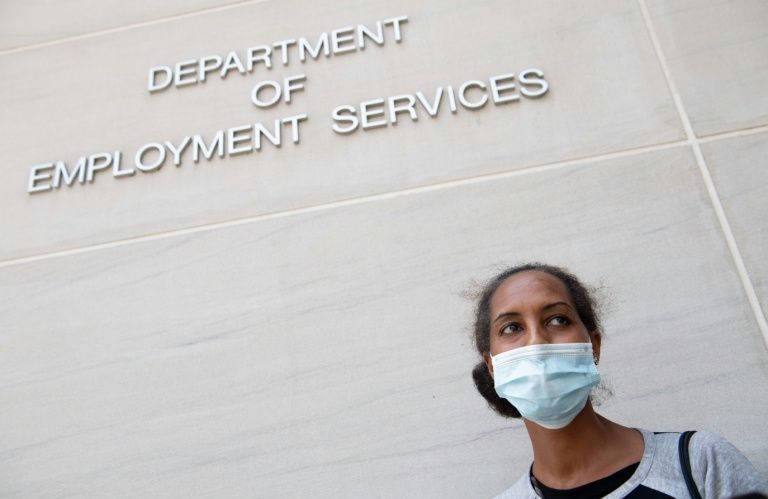August looms as uncertain deadline for jobless Americans
Diana Yitbarek said she hasn’t collected benefits because of a problem with Washington’s unemployment system, and hasn’t been able to contact administrators to fix the issue. ©AFP SAUL LOEB
Washington (AFP) – Unemployed American workers face a critical juncture on the first day of August, when extra jobless benefits keeping some from poverty are set to expire.
The $600 per-week payments have lessened the hit for millions of American workers laid off as the COVID-19 outbreak shuttered businesses across the United States.
But Congress financed the payments only through July 31, meaning they are scheduled to run out even though hiring hasn’t picked back up in many parts of the country.
Lawmakers are gathering in Washington to debate what to do next, with President Donald Trump favoring a payroll tax cut while Democrats want to see the benefits extended.
Though critics say the extra funds have encouraged people to collect unemployment rather than work, Gary Burtless, an economist at the Brookings Institution, credited them with sparing some 31 million people a more severe hit from the downturn.
“They can pay for their rent, they can pay for their groceries and so forth,” Burtless said.
The expanded benefits included in the $2.2 trillion CARES Act federal rescue package are on top of weekly benefits set at the state level.
Those payments range in length, from six months in Maryland to three months in Nevada and Georgia. There is also a huge disparity in how much money is given, from $235 a week in Mississippi to $823 a week in Massachusetts.
– Better than a job? –
Burtless said the additional payments helped millions of Americans avoid slipping into poverty, and provided support to the consumer-driven economy.
“When they’re collecting the check, they can spend money and that money is then received by employers and companies and can keep employment up in those companies and employers,” he said.
A note from Oxford Economics said the expiration of the benefits would lead unemployed individuals to lose about two-thirds of their income in August.
Extending the benefits through December would lift US growth around two percent in the fourth quarter and “preserve one million jobs compared to a sudden-stop policy.”
Critics of the money contend the generous payments discourage workers in low-wage jobs from searching for employment, a conclusion partially supported by a recent Federal Reserve report that documented some companies complaining of difficulty in filling posts.
The survey cited other factors for this trouble beyond the unemployment benefits, including prospective workers’ fears of getting COVID-19 and the need to take care of children whose schools or summer camps have been closed.
“If the benefits are high enough, some people won’t look for jobs,” Burtless said. “But… at the moment, there are many, many more people desperate for jobs than there are jobs that are desperate to have someone fill them.”
Burtless expects some kind of extension to the payments — perhaps $150 or $200 per-week through the end of the year instead of $600, driven by lawmakers’ recognition of the need to support workers as well as to not alienate voters ahead of elections in November.
– ‘Still struggling’ –
Many expect downbeat economic conditions to persist in the United States, which has seen the world’s worst outbreak of COVID-19.
“I’m still struggling to pay the bills and I’m still looking for a job,” said Diana Yitbarek, who has been unemployed since April. “And nowadays it’s hard to find a job because everything is closed.”
The 44-year-old Washington resident has not been able to collect benefits because she lost the password to her account with the local government, and hasn’t been able to reach anyone for assistance.
“Whenever I call, the unemployment office is on the answering machine,” she said. “It takes seven hours, eight hours to answer, sometimes it takes longer.”
The city’s unemployment office isn’t open to in-person visits, but elsewhere in the country local media have shown long lines of people waiting to register for benefits, some of whom end up sleeping outside overnight.
Monthly unemployment reports have exceeded expectations over the last two months, a sign the economy was recovering more quickly than expected.
But economists see indications hiring is again taking a hit as more states freeze or roll back steps to reopen the economy due to spiking coronavirus cases.
Disclaimer: Validity of the above story is for 7 Days from original date of publishing. Source: AFP.


